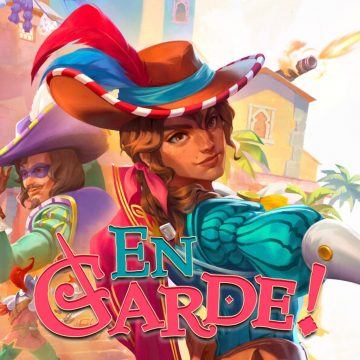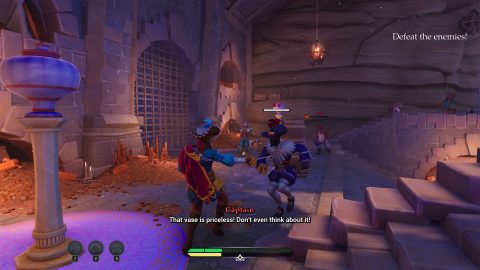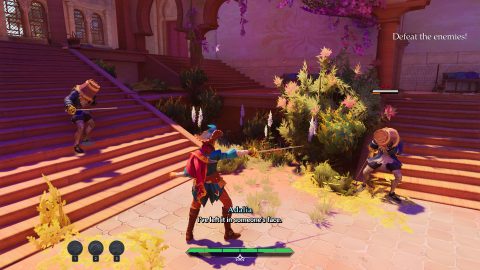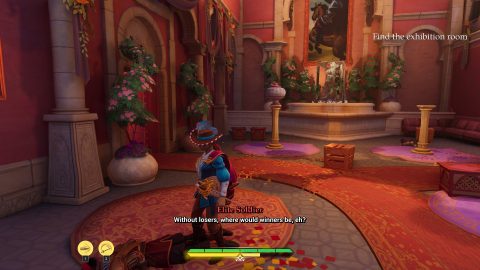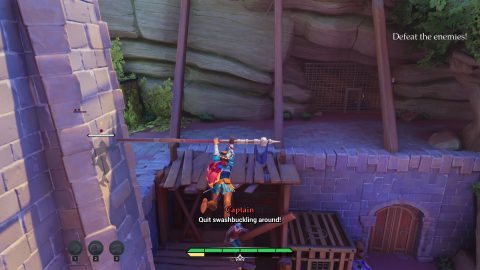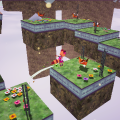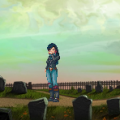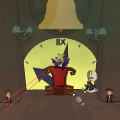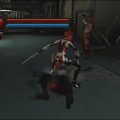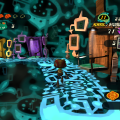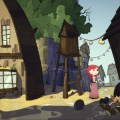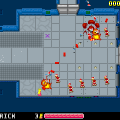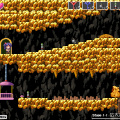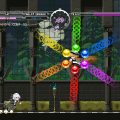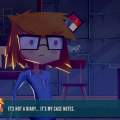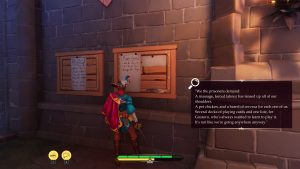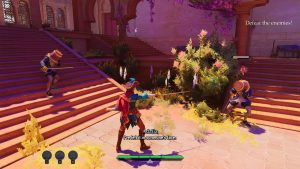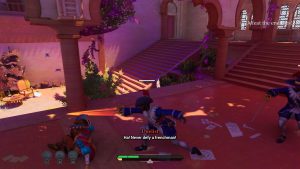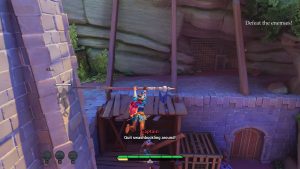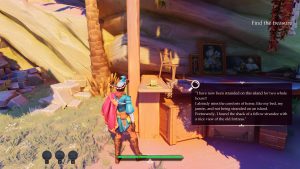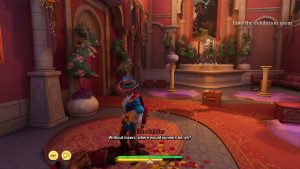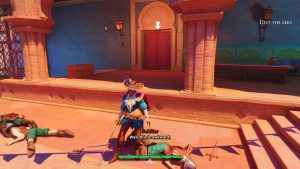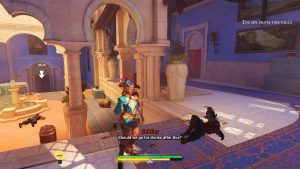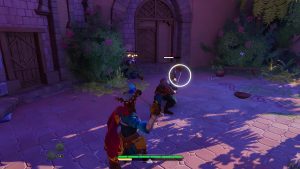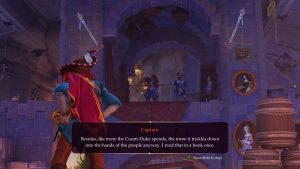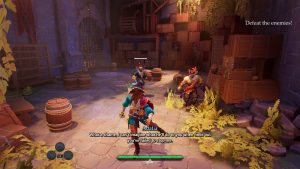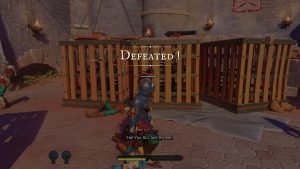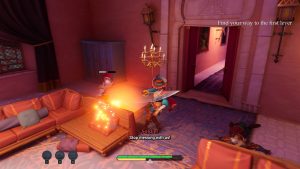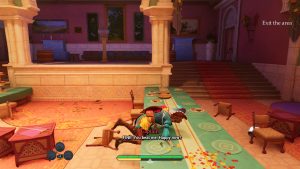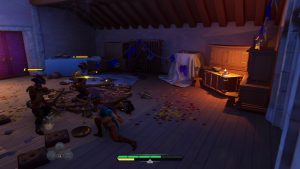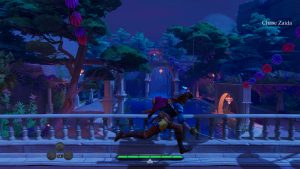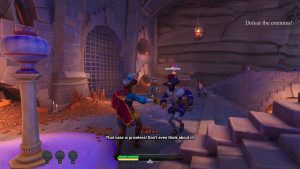Student projects are not usually the sort of thing that one expects to see turned into released games, but lest we forget, Portal started out that way, in the form of the student project Narbacular Drop. En Garde! is a similar kind of story, having originated as a student project in France, which ended up being nominated for three “best student game” awards and winning two of them. Five years after its 2018 debut, the full game was released, in a form that is significantly different from the form originally created by eight students, but with far more polish and touched up gameplay.
So what is this game that impressed judges?
En Garde! is a sword fighting comedy game set in 17th century Spain, in which you assume the role of Adalia da Volador, an acrobatic swordswoman with a quick wit who is even quicker with a rapier. Very quick, in fact, as the game moves at a very fast pace.
The combat system starts out frantic but basic, until you learn more things you can do later on. Involving swords alone, you can poke with the sword, parry an attack, or dodge roll to avoid an unblockable attack. Enemies telegraph their moves with quick colored flashes of white (parry) or orange (dodge), and you’re not necessarily required to react accordingly, but it helps if you do. Enemies frequently gang up on you, so if you parry one attack while another enemy is performing an unblockable orange attack, you’re gonna get hit. Learning crowd management is key to survival.
Which is why it’s a good thing Adalia does a lot more in combat than sword fight.
You have a handful of acrobatic moves, and you can interact with the environment. You can dive over tables, jump and grab onto ropes to swing around and jump past enemies, kick stunned enemies into props such as vases and weapon racks that can fall over, kick boxes and exploding barrels into enemies, and you can pick up and throw objects at enemies, or even onto their heads! And of course, there’s that old swashbuckling stereotype, the chandelier which can be cut down to land on a group of enemies.
All of these help a lot with crowd management. You might kick some boxes into a few enemies, throw a vase onto a particularly tough enemy’s head to blind him for a few seconds, then use your sword to take out the weaklings before the tough enemy manages to get his head free.
That’s pretty much what you’ll have to do to survive the massive enemy numbers the game throws at you in later levels, as it’s pretty much impossible to sword fight one enemy while others are performing parryable or unblockable moves at the same time. Especially when guard bars show up.
Guard bars are an additional meter that some special enemies in the late game have, which only decreases when the enemy is either attacked or successfully dodged the correct way (parrying or dodge rolling), and which instantly refills if you make a single mistake. These can be really difficult to deal with, so there’s actually an option to disable this feature without affecting the rest of the game’s difficulty level. In fact, while on this subject, it’s worth pointing out that there are three difficulty levels and the option to enable and disable invincibility at any time, as well as a toggleable auto-parry feature. So there’s a fair amount of difficulty customization.
Aside from guard bars, there are also enemies with other meters that decrease if attacked but refill if not attacked for a certain amount of time. They’re easier to deal with. Buckets are your friend, and the bane of your enemies!
After every battle, Adalia’s life fully refills. It also sometimes partially refills during long fights with large groups, or at specific moments during boss fights. Between combat, there’s the usual simple puzzles and mild platforming one might expect, to add a bit more variety to the gameplay. The platforming is totally linear, as you find the path of things to climb and jump from to make your way to the next area. Along the way, you might find a hidden area which contains something interesting to read or look at, some of which are tied into the game’s sense of humor.
Let’s talk about that sense of humor, since this is a comedy game, so humor is a huge part of its identity. Throughout the game, you’ll find posters, journal entries, and more, and almost all of them are silly, while still tying into the game’s story. An early poster tells a group of soldiers to stand at a dock and wait for a “dashing woman in a feathered hat” to kick them into the water so they can get paid their bribe, and to not ask any questions. Right afterwards, since you’re still in the tutorial section of the game, a group of soldiers standing on docks ask you to kick them into the water so they can get paid, which is the game’s way of teaching you the kicking mechanic.
While the story is based around overthrowing a corrupt tyrant, his tyranny, corruption and ego are played for laughs. There’s even a bit of political satire in the form of someone saying he read in a book that if the tyrant makes more money, it will “trickle down” to his people. Most of the comedy, though, comes from the game’s in-battle dialog. There is an absolute ton of dialog that can occur during battle, as Adalia and her enemies trade both sword blows and verbal barbs. To reduce repetition, the dialog is also randomized if you fail and have to retry. Some of the dialog comes in the form of Adalia and the enemies both having a conversation as the fight rages on. For example:
“Do you want to be on the wrong side of history?”
“History is written by the victors!”
“You just proved my point.”
Some of it comes in the form of one-liners from both sides. Even being defeated by the enemies can result in enemies bragging that they won a bet. Or defeating the enemies can result in them saying a wide variety of things while they lay on the ground, which also makes it clear that they’re not dead. Heck, walking around the room and repeatedly walking past defeated enemies results in them saying more and more things.
Now let’s talk presentation. En Garde! is a low budget indie title, but one with production values dedicated to the areas that matter most. Voice acting is abundant and well delivered in a corny comedic way. Music is consistently upbeat traditional Spanish music, and a bell tone plays when your life drops to one hit. The graphics are vibrantly colored and look like a cartoon painting. There’s even an effect where things in the far distance are blurred in a splotchy way that heavily resembles a watercolor painting.
At the same time, some corners were cut to save money: Many visual assets are recycled throughout the game. No-one moves their mouths when they talk, which saves on animating accurate lip syncing. And cutscenes are often represented as simply a single picture with narration. The game is rather short, clocking in at roughly three to four hours. If it had gone on for much longer, it might have run out of joke material and gameplay ideas.
On a parental note, there is mild profanity from time to time, in the form of the occasional “damn” and “hell.” There is no blood, and the chatter from defeated enemies also makes it clear that no-one dies. Enemies even talk about capturing you rather than killing you. Despite also admitting that Adalia has a funny habit of escaping jail repeatedly.
The developers released the student project version of En Garde! as a free download on itch.io. The student version has many significant differences from the release version, and it can be interesting to see what changes were made between the game’s early form and its final form.
Instead of being divided into linear levels, the student version takes place in one large open level, where players need to not only defeat specific bosses but also chase them down when they run away. There’s a cheering crowd in one area that cheers on the battle. Your life doesn’t autofill very often, but can instead be refilled by pressing a button when another meter fills up. Tons of objects can be kicked over, but they have less of an effect than in the final game. And there is barely any need to parry or avoid unblockable attacks.
At the same time, the student version shows the promise of the idea. It contains the same type of banter dialog, though with less humor than the final release. It contains a more basic version of the game’s combat system. The basic ideas impressed judges so much that they were polished up into a final release that ironed out the many rough edges and resulted in a much more well-put-together product.
Keep in mind that if you plan to download the free student project version of the game, it may run poorly on your computer, even if it’s sporting an RTX 4070 Ti. It is not optimized at all, unlike the final game, which runs excellently.
En Garde! may not have the largest budget or be the longest game, but it is an example of the innovation that often originates from the indie scene, or even the student scene. It’s the length of a movie, plays like a swashbuckling comedy film, and it’s an original theme for a video game. Only the indie scene would have created something like this.
Links:
https://engarde.itch.io/en-garde – the original student project version of the game

